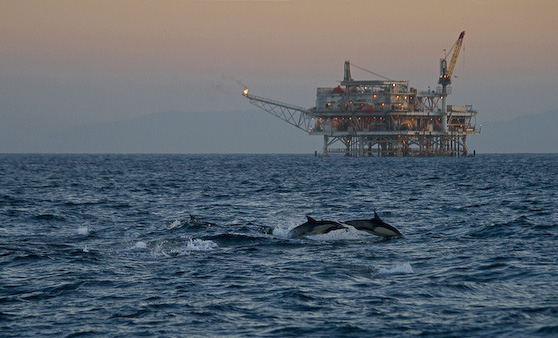Trump Administration to Hold California Hearing on Offshore Oil Drilling Proposal
Sacramento Hearing Likely to Be Both a Raucous and Fundamentally Flawed Affair
Legal Planet colleague Eric Biber this week has published a series of posts on the Trump Administration’s controversial–and deeply flawed–proposal to open most of the nation’s Outer Continental Shelf to offshore oil and gas development. I won’t attempt to retread the ground Eric has ably covered, but want to highlight a major upcoming and related event in California.

As part of the U.S. Department of the Interior’s offshore leasing program under the Outer Continental Shelf Lands Act, DOI’s Bureau of Ocean Energy Management is required to conduct public hearings to obtain public comment on the sweeping proposal announced last month by the Trump Administration. The only such hearing in California on the Trump Administration’s plan is scheduled for Thursday, February 8th, in downtown Sacramento. (Public comments can also be submitted online, with a deadline of March 9, 2018.)
DOI’s February 8th hearing is fundamentally flawed, for several distinct reasons:
- That sole California hearing is being held not in one of the state’s major coastal metropolitan areas–Los Angeles, the Bay Area or San Diego–but in the inland state capital. This makes it difficult for those California local governments, coastal-dependent businesses and residents most directly affected by the federal drilling proposal to attend and participate in that hearing.
- The scheduling of the hearing is both curious and suspicious: it’s slated for the same date as the California Coastal Commission’s monthly meeting, which was calendared many months ago. That will prevent the Commission–California’s principal steward of the state’s precious coastal resources–from devoting its full attention to the DOI hearing. Like the venue DOI selected for the single California-based hearing on its leasing proposal, tomorrow’s hearing date and conflict with the Coastal Commission meeting likely are no accident.
- Finally, my sources advise that the February 8th DOI hearing promises to be a tightly structured and highly choreographed affair, with precious little opportunity for meaningful testimony from the interested public that will be attending. Word has it that the “hearing” will consist mostly of a formal presentation by DOI officials to the audience, with public comment being relegated along the lines of a “comment box.” Assuming those reports are accurate, this format makes substantive public comment virtually impossible, with the Department dispensing its own information and opinions rather than actively listening to–much less acting upon–the public’s concerns.
There are plans for a large demonstration on the State Capitol steps Thursday afternoon immediately before the scheduled DOI hearing begins nearby at 3:00 p.m. Scheduled to appear at the demonstration are state legislators from both political parties. (Opposition to offshore oil drilling is a remarkably bipartisan phenomenon, not just in California but also in most of the other coastal states that are in the Trump Administration’s offshore oil and gas drilling crosshairs.)
In addition to all the legal and policy points colleague Eric Biber has made in his recent posts, the Trump Administration’s aggressive efforts to expand offshore oil and gas development in the OCS make a mockery of former candidate and now-President Trump’s professed embrace of cooperative federalism and states’ rights principles. Both along the nation’s Pacific and Atlantic Coasts, governors and legislators from both political parties have objected strenuously to the perceived dangers presented by DOI’s expanded offshore oil and gas development efforts. No matter. The Administration appears intent on moving forward, in total disregard of the concerns and policy preferences expressed by state and local government leaders.
DOI’s February 8th hearing in Sacramento demonstrates the Trump Administration’s bad faith similarly extends to the venue, date and apparent procedures on which it has settled for the sole planned California hearing on its misguided OCS development proposal. That hearing is rife with politics and Kabuki theatrics, but bereft of principle or a legitimate desire to learn of Californians’ concerns about DOI’s ill-conceived OCS policies. Sad.
Update: DOI’s February 8th “hearing” on the Administration’s offshore oil and gas leasing proposal turned out to be an egregious misnomer: the event was far less a hearing or meeting than it was a four-hour open house-style, informational poster hall session. There were no seats for lingering, no single presentation or agenda and–most importantly–no formal, oral public comment period. The event venue in downtown Sacramento was closely monitored by DOI staff, with a maximum of 150 people being allowed into the event center at any one time. Once inside, members of the public were allowed to wander around several DOI “stations”: one played a DOI-produced video, while another allowed interested folks to log their comments on the OCS drilling proposal through either computer terminals or in writing on forms made available by DOI staff.
The absence of any meaningful public hearing, opportunity to question DOI officials or to present verbal testimony was predictable, if sorely disappointing. This minimalist format strongly suggests that DOI is not interested in meaningful interaction with or feedback from those California residents who are most affected by the Administration’s OCS development plans.
According to recent media reports, California/Sacramento is not being singled out in this regard. DOI is apparently utilizing the same pro forma procedures in it’s mis-named “public hearings” around the country. Opponents of DOI’s OCS proposal and the media have expressed strong objections to the event choreography as skirting due process and procedural rights guaranteed under federal law. With good reason.
(U.C. Davis School of Law Environmental Law Fellow Olivia Filbrandt contributed to this updated post.)







Reader Comments